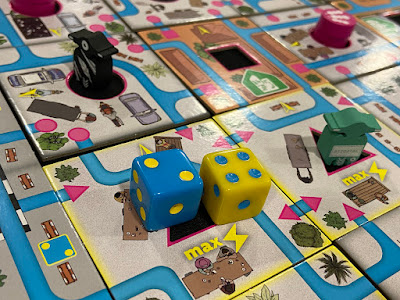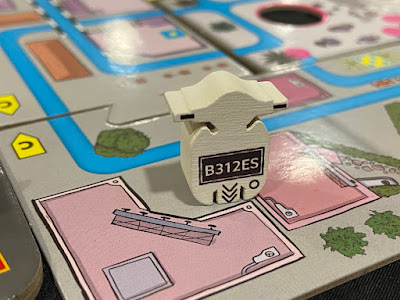The Game
Jakarta Traffic, being about Jakarta, is, of course, a game from Indonesia. However the designer Simon Schmieder is actually from Germany. He now lives in Indonesia. This game was crowdfunded successfully on Kickstarter. Simon came for the Asian Board Games Festival in Malaysia last year. At the time I wasn't able to try his game. He was here again this year, so I took the opportunity to try Jakarta Traffic. He sold out all the copies he brought by the second day of the fair. This is a popular game!
In this game you play gojek drivers. Gojek drivers are delivery guys on motorcycles. They deliver items and also carry passengers. Since they are on motorcycles, they can weave through traffic. You use a phone app to hail riders. This is a pick-up-and-deliver game. The main way you earn points is by picking up items and delivering them to specific destinations. The road network is intimidating at first, but once you get familiar with identifying paths, it is not as scary as it looks. On your turn you move from one terminal of a road network on your tile to any other terminal of that same road network. This can be quite a distance if that road network is large. Some road networks have multiple terminals, which means you have options. Before you move, you have the option of rotating a tile or replacing a tile with the one in your hand. These will modify the road networks on the board and change your possible destinations. There are many ways you can change the networks. One important restriction is you can't change any tile that has tokens on it.
Think of this little board as the constantly updated list of orders in the gojek riders app. This board specifies the current contracts you can fulfil to score points, i.e. deliveries you need to make. Information here includes what to deliver (pink disk), where to deliver them to (green building), and how many points you score for making the delivery (star). What's interesting about this board here is whenever anyone makes a delivery, this board changes. The goods being delivered drops to the bottom position and all other goods move up a rank. The building that has just received a delivery shifts to the inactive section on the right. Other buildings shift down, and an inactive building moves to the top spot. As you can see, this is a huge change and can really mess up your plans. The game becomes a race to fulfil contracts, because if you are slow, your goods may devalue and you may need to reroute. You can plan for the changes on the contract board. This is an open information game. If you think someone will make a certain delivery soon, you can predict how the board will change, and you can figure out what you should do next to maximise your points.
One possible tactic is delivering two items at the same time to the same building. That's an efficient way to score points.
This is the player board. There are four spaces for stars at the bottom right which means the game ends when someone makes the 4th delivery. The battery charge token at the top right is an important part of the game. Every turn your phone consumes battery charge, and when your battery is flat you cannot pick up goods or complete deliveries. You need to find a charging station to charge your phone.
Notice there are three chat tokens. When you meet another player, you hear gossips and claim one chat token. Chat tokens are worth points at the end of the game. When you meet another player, both of you gain one level of battery charge, because while chatting you also charge your phone using your power banks.
In case you cannot work out any useful path, one last resort is rolling the dice. You go where the dice tell you to. This is equivalent to taking unknown alleys and seeing where they lead you eventually.
The Play
This is a pick-up-and-deliver game. Every turn you are solving a puzzle. You try to figure out how to get to a specific tile. If you can't work that out, you have to go for the second best option. I find that often you can work something out, by either rotating a tile or by playing the tile in hand. For new players this can feel overwhelming, but once you learn to read the map, it is actually not as daunting as it initially seems.
The policeman token is placed whenever anyone rotates a tile or replaces a tile. It temporarily protects that tile from being further manipulated. The policeman only gets moved if someone changes some other tile.
There is urgency in making deliveries, because if you don't do it quickly, the supply and demand will change and your plans can be ruined. Even if you can still do something with the goods in hand, you probably won't be scoring as many points, or you may need to take a longer route to get it delivered.
You can also think of this as an efficiency game. You not only have to do the deliveries quick, you also want to maximise the earnings from each delivery. This is a perfect information game. You can calculate what may happen in the next few turns, so there can be analysis paralysis if you play with people who want to calculate many steps ahead. Make a honking sound and tell them to just move dammit.
The tile you have in hand is important. One useful tactic is swapping it with another tile on the board even when you don't need to do it to build a path for movement. You do it for the sake of giving yourself more options on a future turn.
The Thoughts
This is a game with a very local feel. Local as in Indonesia local, not Malaysia local. All the elements come together to create a unique experience - the art, the setting, the mechanisms. This is a mid-weight game which non-gamers will be able to pick up. I like how it delivers an immersive experience.
At the recent Asian Board Games Festival I had the opportunity to meet and exchange stories with industry players from other Asian countries. They all find that in South East Asia, and perhaps even in Asia as a whole, it is card games which sell. When some publishers decide to make a boardgame, it is an experimental project for them, to see how well a game with a board sells. Thus far, they find that card games still do much better than boardgames. For better or worse, that is our current reality. Jakarta Traffic, being a boardgame, being able to achieve such success, is no simple feat!








No comments:
Post a Comment